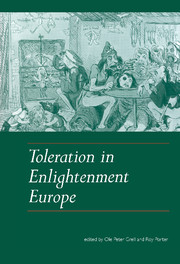Book contents
- Frontmatter
- Contents
- List of contributors
- Preface
- 1 Toleration in Enlightenment Europe
- 2 Toleration and the Enlightenment Movement
- 3 Multiculturalism and Ethnic Cleansing in the Enlightenment
- 4 Intolerance, the Virtue of Princes and Radicals
- 5 Spinoza, Locke and the Enlightenment Battle for Toleration
- 6 Toleration and Enlightenment in the Dutch Republic
- 7 Toleration and Citizenship in Enlightenment England: John Toland and the Naturalization of the Jews, 1714–1753
- 8 Citizenship and Religious Toleration in France
- 9 A Tolerant Society? Religious Toleration in the Holy Roman Empire, 1648–1806
- 10 Enlightenment in the Habsburg Monarchy: History of a Belated and Short-Lived Phenomenon
- 11 Toleration in Eastern Europe: the Dissident Question in Eighteenth-Century Poland–Lithuania
- 12 Toleration in Enlightenment Italy
- 13 Inquisition, Tolerance and Liberty in Eighteenth-Century Spain
- Index
6 - Toleration and Enlightenment in the Dutch Republic
Published online by Cambridge University Press: 03 February 2010
- Frontmatter
- Contents
- List of contributors
- Preface
- 1 Toleration in Enlightenment Europe
- 2 Toleration and the Enlightenment Movement
- 3 Multiculturalism and Ethnic Cleansing in the Enlightenment
- 4 Intolerance, the Virtue of Princes and Radicals
- 5 Spinoza, Locke and the Enlightenment Battle for Toleration
- 6 Toleration and Enlightenment in the Dutch Republic
- 7 Toleration and Citizenship in Enlightenment England: John Toland and the Naturalization of the Jews, 1714–1753
- 8 Citizenship and Religious Toleration in France
- 9 A Tolerant Society? Religious Toleration in the Holy Roman Empire, 1648–1806
- 10 Enlightenment in the Habsburg Monarchy: History of a Belated and Short-Lived Phenomenon
- 11 Toleration in Eastern Europe: the Dissident Question in Eighteenth-Century Poland–Lithuania
- 12 Toleration in Enlightenment Italy
- 13 Inquisition, Tolerance and Liberty in Eighteenth-Century Spain
- Index
Summary
The eighteenth-century Dutch toleration debate can only be understood in the specific context of the Enlightenment. The arguments for toleration in the eighteenth century were quite similar to those of earlier decades, but the religious context had changed significantly: a new intellectual force, going under the name of Enlightenment, affecting the status of Christianity, made itself felt in the Dutch Republic like elsewhere in Europe. It was this change in context which occasioned a series of bitter controversies about toleration in the United Provinces from about 1740 onwards.
The eighteenth-century Dutch toleration debate was not a matter of an intellectual elite as it had been during the early Enlightenment, when Spinoza and Philippus van Limborch, John Locke and Pierre Bayle, Gerard Noodt, Jean Barbeyrac and Jean Le Clerc, published their essential writings on tolerance in the Dutch Republic. The religious and political climate in the Republic was characterized by a limited toleration which, however, was wider than in most other European nations. Such an atmosphere inspired those at home and abroad who were engaged in a campaign in favour of toleration. Native and foreign traditions advocating toleration went hand-in-hand in order to promote their ideal throughout Europe through learned treatises and, in particular, periodicals.
The Dutch context in which Locke came to write his standard work on tolerance was marked by his friendship with Van Limborch who, as a true Remonstrant in the line of that great propagator of toleration, Episcopius, strongly argued for toleration. Anticipating the Revocation of the Edict of Nantes, Bayle arrived in the Republic where, from Rotterdam, he launched scathing attacks on orthodox rigid notions of tolerance.
- Type
- Chapter
- Information
- Toleration in Enlightenment Europe , pp. 114 - 132Publisher: Cambridge University PressPrint publication year: 1999
- 1
- Cited by

